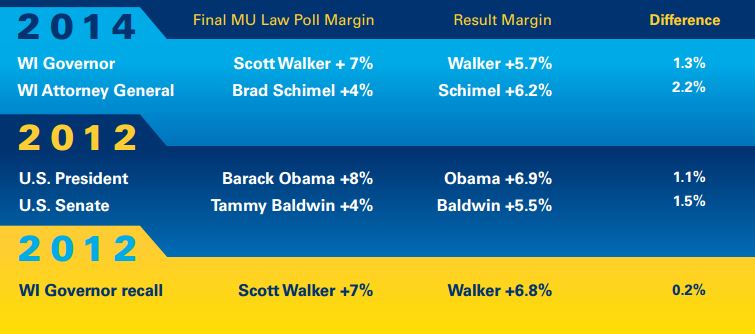
2308carbalr
The Marquette Law School poll called each winner correctly in the 2012 and 2014 elections. Photo courtesy Chris Jenkins
This year, the Marquette Law School poll generated 360 national media stories in four months, according to a study conducted by the university.
The poll was not created solely for election updates, but instead was originally used to gather public opinion on civic issues in Wisconsin.
“At the time we were talking about this, I did not appreciate just how massive politics would loom in this,” poll director Charles Franklin said.
Franklin thought urban, rural and religious life would be topics of discussion. He and law school fellow Mike Gousha began talking about developing the law school’s public policy program.
Gousha hosted an “On the Issues” conversation series where political experts came to the law school and spoke about public policy, while Franklin wanted to see more of the public’s opinion represented. The two discussed creating a poll.
“I’m either one of those idealistic or naive people that believe polling serves an important civic purpose of giving a forum where a representative sample of the public gets to have their say,” Franklin said.
Gousha and Franklin brought the idea to the dean of the law school, Joseph Kearney, who was not immediately convinced.
“When I first heard about (the law school’s) interest in public polling, I did not understand what a public good such a survey could be,” Kearney said. “It took some explanation.”
Franklin, Gousha and other faculty explained that the poll would cover more than the “political horse race.” In addition to election coverage, it would examine public policy and support faculty research, and provide an accurate depiction of public views.
“We should not simply assume that we can know simply from people’s partisan identifications what all of their views will be on every topic,” Kearney said.
Some of the social issues the poll has analyzed include economic inequality, education and water quality.
After a year of internal discussion, in 2012 Marquette University Law School created the poll. Kearney described the timing as “exactly right” because it was not only a presidential election year, but there was also a governor recall election between Gov. Scott Walker and Mayor Tom Barrett.
During its first year, the poll generated more than 650 local and national media stories, including television coverage reaching a total of 10.6 million viewers.
Although the poll became a trusted source among the media, there were times it was criticized by both parties.
“Any public poll always at least irritates one side,” Franklin said. “That comes with the business and you can’t let that bother you.”
According to Franklin, Democrats heavily criticized the poll in 2012 when it showed Gov. Walker had a lead. In the fall, conservative Republican radio denounced the poll when President Barack Obama and Sen. Tammy Baldwin were predicted to win.
The poll was correct about each winner. “I think it turned out to be a huge blessing,” Franklin said about the criticisms the poll received from both parties. “We were right when a Democrat was winning and when a Republican was winning.”
By the end of 2012, Kearney was left with one question: “At the end of that year we had an extraordinary run and we had one question: Should we continue it?”
Franklin was only supposed to work at Marquette for one year, but Franklin chose to leave the University of Wisconsin-Madison, where he was a political science professor, to stay at Marquette.
Associate director of university communication Chris Jenkins said Franklin’s methodology is responsible for the poll’s accuracy. “Professor Franklin is widely known for his accuracy,” Jenkins said. “That comes from his expertise and his commitment to using live interviewers who talk to respondents via randomized calls to both cell phones and landlines.”
Many campaigns run their own polls, but Kearney said constituents deserve the same access to that information.
“(Politicians) have a sense what public opinion is, but the public doesn’t,” Kearney said. “If we ask a question, we release the results. We put it all out there.”
